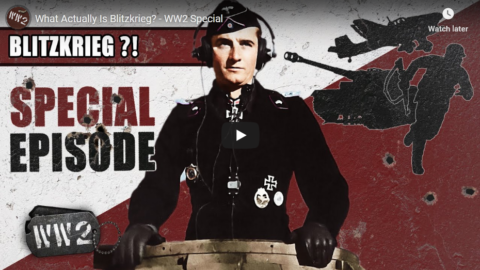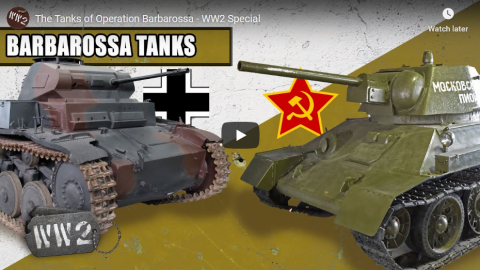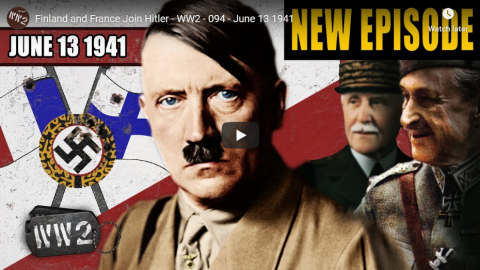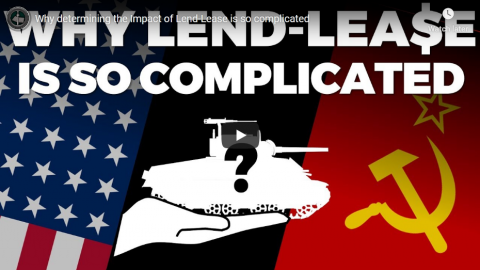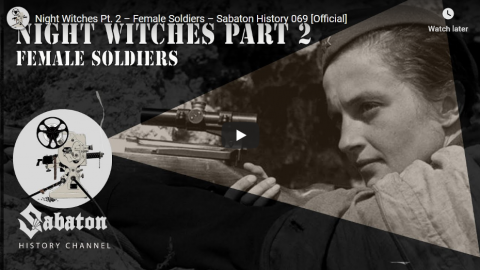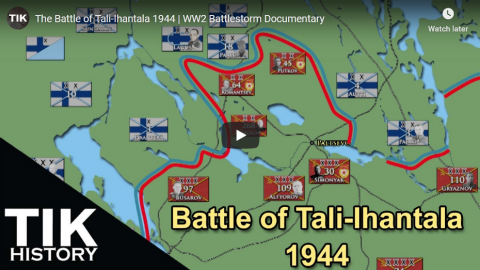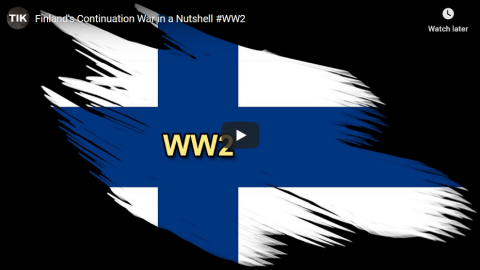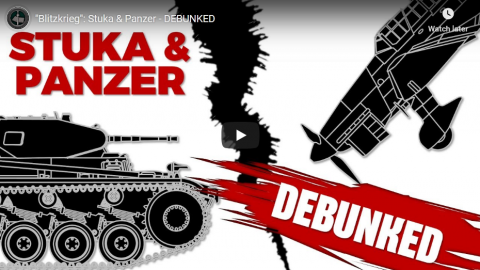World War Two
Published 19 Jun 2020The future looks bright for soviet women in the 1910s, they have the right to vote and they’re on track for social emancipation. Yet this doesn’t last long. Soon, the demands of the nation will rob them of these promises.
Join us on Patreon: https://www.patreon.com/TimeGhostHistory
Or join The TimeGhost Army directly at: https://timeghost.tvFollow WW2 day by day on Instagram @World_war_two_realtime https://www.instagram.com/world_war_two_realtime
Between 2 Wars: https://www.youtube.com/playlist?list…
Source list: http://bit.ly/WW2sourcesHosted by: Anna Deinhard
Written by: Isabel Wilson
Director: Astrid Deinhard
Producers: Astrid Deinhard and Spartacus Olsson
Executive Producers: Astrid Deinhard, Indy Neidell, Spartacus Olsson, Bodo Rittenauer
Creative Producer: Joram Appel
Post-Production Director: Wieke Kapteijns
Research by: Isabel Wilson
Edited by: Karolina Dołęga
Sound design: Marek KamińskiColorizations by:
Klimbim
Carlos Ortega Pereira, BlauColorizations, https://www.instagram.com/blaucoloriz…Visual Sources:
Library of Congress
Adam Jones from Flickr: https://www.flickr.com/photos/adam_jo…Icons from The Noun Project: Sandhi Priyasmoro, Sarah Rudkin, Andrew Doane, Vectors Market, Adrien Coquet, ProSymbols, Luke Anthony Firth, Russia Woman & Gan Khoon Lay
Music:
“March Of The Brave 10” – Rannar Sillard
“Disciples of Sun Tzu” – Christian Andersen
“Deviation In Time” – Johannes Bornlof
“Other Sides of Glory” – Fabien Tell
“The Inspector 4” – Johannes Bornlöf
“Sailing for Gold” – Howard Harper-Barnes
“London” – Howard Harper-Barnes
“Split Decision” – Rannar SillarResearch sources:
– Lenin On the Emancipation of Women (1965), pp. 63–4. First Published July 1919, as a pamphlet
– Selected Writings of Alexandra Kollontai, Allison & Busby, 1977, First Published 1921, as a pamphlet, trans Alix Holt.
– Wendy Goldman, “Recasting the vision: The resurrection of the family”. In Women, the State and Revolution: Soviet Family Policy and Social Life, 1917–1936, (Cambridge Russian, Soviet, and Post-Soviet Studies, (1993) pp. 296-336), p.310Archive by Screenocean/Reuters https://www.screenocean.com.
A TimeGhost chronological documentary produced by OnLion Entertainment GmbH.
June 20, 2020
Soviet Gender Equality Was a Scam – WW2 – On the Homefront 004
June 19, 2020
What Actually Is Blitzkrieg? – WW2 Special
World War Two
Published 18 Jun 2020When the Nazi war machines tears through Poland, France, and the Soviet Union, people will call it Blitzkrieg. But what is Blitzkrieg and is it anything that unique?
Join us on Patreon: https://www.patreon.com/TimeGhostHistory
Or join The TimeGhost Army directly at: https://timeghost.tvFollow WW2 day by day on Instagram @World_war_two_realtime https://www.instagram.com/world_war_two_realtime
Between 2 Wars: https://www.youtube.com/playlist?list…
Source list: http://bit.ly/WW2sourcesHosted by: Indy Neidell
Written by: Francis van Berkel
Director: Astrid Deinhard
Producers: Astrid Deinhard and Spartacus Olsson
Executive Producers: Astrid Deinhard, Indy Neidell, Spartacus Olsson, Bodo Rittenauer
Creative Producer: Joram Appel
Post-Production Director: Wieke Kapteijns
Research by: Adam Adkins
Edited by: Mikołaj Cackowski
Sound design: Marek Kamiński
Map animations: Eastory (https://www.youtube.com/c/eastory)Colorizations by:
Jaris Almazani (Artistic Man) – https://instagram.com/artistic.man?ig… (edited)
Carlos Ortega Pereira, BlauColorizations – https://www.instagram.com/blaucoloriz…
Julius Jääskeläinen – https://www.facebook.com/JJcolorization/
Dememorabilia – https://www.instagram.com/dememorabilia/
Musvage https://commons.wikimedia.org/wiki/Fi…
Klimbim https://www.flickr.com/photos/2215569…Sources:
Portrait of Basil Liddell-Hart, courtesy National Portrait Gallery
Portrait of Douglas McGarel Hogg, courtesy National Portrait Gallery
IWM H 20697, Q 6337, D 1966
Bundesarchiv
from the Noun Project: Target by RITASYA, documents by DinosoftLab, Tank by mbok sumirna, Armored Car by Martin, Plane by Graphic Enginer, transceiver by Eucalyp
Breaking A Wall Down (With A Hammer) by scampsie https://freesound.org/people/scampsie…Soundtracks from the Epidemic Sound:
Johannes Bornlof – “Last Man Standing 3”
Reynard Seidel – “Deflection”
Fabien Tell – “Last Point of Safe Return”
Hakan Eriksson – “Epic Adventure Theme 4”
Johannes Bornlof – “The Inspector 4”
Johannes Bornlof – “Death And Glory”
Bonnie Grace – “The Dominion”
Bonnie Grace – “Imperious”Archive by Screenocean/Reuters https://www.screenocean.com.
A TimeGhost chronological documentary produced by OnLion Entertainment GmbH.
“Hill 3234” – The Soviet-Afghan War – Sabaton History 072 [Official]
Sabaton History
Published 18 Jun 2020It happened during the last stage of the Soviet-Afghan War.
Already withdrawing its forces, Soviet High Command needed to display its might one last time by recapturing the vital Satukandav Pass. But to achieve that goal, the commanding heights surrounding the pass had to be held against continuous Mujahideen attacks.
In the Battle for Hill 3234, an outnumbered force of Soviet paratroopers held their own against relentless attacks from the Afghan rebels.
Support Sabaton History on Patreon: https://www.patreon.com/sabatonhistory
Listen to “Hill 3234” on the album The Last Stand here:
CD: http://bit.ly/TheLastStandStore
Spotify: http://bit.ly/TheLastStandSpotify
Apple Music: http://bit.ly/TheLastStandItunes
iTunes: http://bit.ly/TheLastStandItunes
Amazon: http://bit.ly/TheLastStandAmz
Google Play: http://bit.ly/TheLastStandGooglePlayWatch the Official Lyric Video of “Hill 3234” here:
https://www.youtube.com/watch?v=K1Xkp…Listen to Sabaton on Spotify: http://smarturl.it/SabatonSpotify
Official Sabaton Merchandise Shop: http://bit.ly/SabatonOfficialShopHosted by: Indy Neidell
Written by: Markus Linke and Indy Neidell
Directed by: Astrid Deinhard and Wieke Kapteijns
Produced by: Pär Sundström, Astrid Deinhard and Spartacus Olsson
Creative Producer: Joram Appel
Community Manager: Maria Kyhle
Executive Producers: Pär Sundström, Joakim Broden, Tomas Sunmo, Indy Neidell, Astrid Deinhard, and Spartacus Olsson
Post-Production Director: Wieke Kapteijns
Edited by: Iryna Dulka
Sound Editing by: Marek Kaminski
Maps by: Eastory – https://www.youtube.com/c/eastoryArchive by: Reuters/Screenocean https://www.screenocean.com
Music by Sabaton.Sources:
– Abramov Andrey, ALDOR46, Fdutil, P.Fisxo; from Wikimedia
– E.Kuvakin
– Erwin Franzen
– Archive of S.V. Rozhkova
– Photos of 350th airborne regiment, courtesy of the 5th airborne company trooper Sergey Novikov
– Archive of the 345th airborne parachute regiment
– Library of Congress, Geography and Map Division.An OnLion Entertainment GmbH and Raging Beaver Publishing AB co-Production.
© Raging Beaver Publishing AB, 2019 – all rights reserved.
From the comments:
Sabaton History
1 day ago
They were only 39
They were told to hold the line…I’m sure most of you know the rest of those lyrics. And after watching this episode of Sabaton History, you also know the real historical events behind those words.
What some of you might not know though, is the story of the guitar solo in Hill 3234. As usual when Joakim had written the song, he sent it out to the rest of the band. Much to his surprise though, this time Thobbe Englund – lead guitarist at the time – sent a file back within the hour. Thobbe had just plugged his guitar in and hit play. He was literally listening to Hill 3234 for the first time when the solo spontaneously popped into his head, and he recorded it on the spot. And to make this solo even more special: it is that very first recording Thobbe made that ended up on the album!
Not one single re-take.
Talk about a blessing from the Muses…
June 17, 2020
June 14, 2020
June 12, 2020
June 9, 2020
It was scientifically inevitable for the Communists to win the Cold War – as foretold in the prophecies
Sarah Hoyt on the “script” that progressives operated under during the Cold War and almost unchanged in detail to the present day, too:
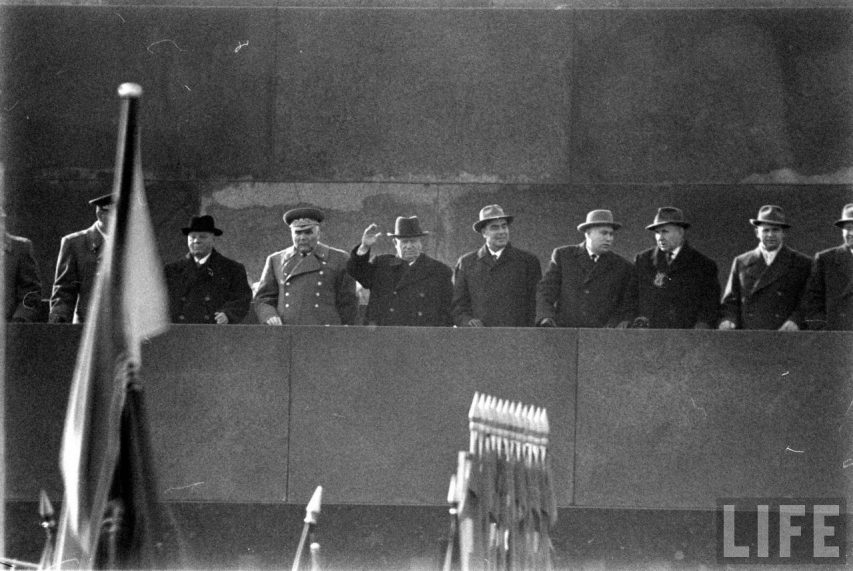
Krushchev, Brezhnev and other Soviet leaders review the Revolution parade in Red Square, 1962.
LIFE magazine photo by Stan Wayman.
… the Cold War had two sides: the USSR and our elites, who had been corrupted and taken over for a long time thanks to the communist agents who had long-marched through our media, our entertainment and our bureaucracy.
Heinlein claimed the Democrats had been taken over by communists, secretly, by the 40s. I have no reason to doubt him. I’m sure most of the bureaucracy and governments in Europe had been taken over that way also.
Even so called conservatives assumed communism would eventually win, because according to the numbers coming out of the USSR and the reporters visiting the USSR — anyone know where Duranty is buried? there should be a line to piss on his grave — they were just so much more efficient. Scientific governance, you know? And anyway, technology was going to be so advanced that most humans would be unemployable, and by the way, there were more and more humans every year, so it was impossible to have all these bourgeois luxuries. So communism, efficient, compassionate, communism was the future, the only way.
The realists who saw it was the only way were willing to do anything to bring it about. Because the people who weren’t as intelligent/well informed would otherwise destroy the world and bring about unimaginable catastrophe.
“Conservatives” were merely those who wanted communism to arrive slower and be a little less violent. Communism with a human face. Socialism on the way to communism. Easing us into our role as cogs in the machinery of the future — where there was no room for personal frills or really emotions — with gentle pneumatic shocks, instead of with the excesses of the Russian and Soviet revolution.
All of this btw is based on three glaring fallacies (phaluscies, since you have to be a dickhead to believe them particularly now.)
1- People are a drain not an asset. They are also a sort of robot incapable of changing behavior in response to changing circumstances.
2- Wealth can’t grow, nor can the carrying capacity of the Earth improve. So since humans can’t respond to reduced infant mortality by having fewer children, the only way to feed everyone is to reduce everyone’s rations. Forever.
3- It is possible for “the best”, properly educated people to be utterly selfless and to administer everyone’s wealth equally and for the common good. They will not revel in power, nor will they avail themselves of any excess. Because, they are absolutely moral and all seeing.
Note the left is still running this script. And some on the right too (Hello, Pierre Delecto!) not to mention all of Europe, left and right. Also note #1 conflicts with the left idea that they can bring about a future in which humans change to be all selfless, etc. But that’s actually complicated and tied in to their myths, which honestly are a Christian heresy, complete with paradise lost.
I know when they started out, the USSR thought it could “engineer” a new human. Homo Sovieticus. But I don’t know enough of Soviet myth to know what underlay that. Maybe it was a behaviorist thing and they thought humans could be trained into being completely selfless automatons. I know by the time I was reading communist theorists (no, I didn’t buy their arguments, but I was required to read them, given when and where I grew up) in the seventies, the philosophy had fallen prey to the agitprop notion that people in madhouses in the US were political prisoners just as in the USSR. (BTW this is part of what underlay the closing of the madhouses.) And that was part of a push in the seventies, as the malfeasance of USSR was starting to be glaring, amid escaped dissidents and escaping information. The push was to “prove” that both systems were equally bad. (The left is still flogging that dead equine, too. So Cubans and Venezuelans are starving? So how many people die of anomie and not being loved enough under capitalism? REEEEE.) So, since Soviets put dissidents in mad houses, so did we. But that necessitated that people who widdled on themselves and/or thought they were a lampshade with a set of dishes thrown in be completely sane “political dissidents”. The only way to do this was to attribute anything communists don’t like to “insanity brought about by capitalism.” This led to crazier byways of thought. For instance, it led to the idea of the pre-historic, pre-agriculture paradise, where everyone was equal, there was no poverty, need, greed, or the heartbreak of psoriasis. A sub-branch of the church believed women were in charge and everyone worshiped the mother goddess. And some of these “scientific, atheist socialists” also believe the goddess actually exists, though G-d doesn’t.
David Friedman had a different formulation for the utopian world many progressives wish for the rest of us:
In the ideal socialist state power will not attract power freaks. People who make decisions will show no slightest bias towards their own interests. There will be no way for a clever man to bend the institutions to serve his own ends. And the rivers will run uphill.
June 7, 2020
Why determining the Impact of Lend-Lease is so complicated
Military History Visualized
Published 14 Aug 2018Determining the impact of the Western Aid that was provided to the Soviet Union in the Second World War is quite controversial. This aid was provided under the Lend-Lease act, as such it is usually just called Lend-Lease. The majority of the support was provided by the United States, yet other countries like the United Kingdom and Canada aided the Soviet Union as well.
Thank you to VonKickass for the Thumbnail Design!
»» SUPPORT MHV ««
» patreon – https://www.patreon.com/join/mhv
» paypal donation – https://www.paypal.com/cgi-bin/webscr…»» MERCHANDISE – SPOILS OF WAR ««
» shop – https://www.redbubble.com/people/mhvi…»» SOCIAL MEDIA ««
» twitter – https://twitter.com/MilHiVisualized
» twitch – https://www.twitch.tv/militaryhistory…» SOURCES «
Boris V. Sokolov: “The role of lend‐lease in Soviet military efforts, 1941–1945”, The Journal of Slavic Military Studies, 7:3 (1994) p. 567-586
Hill, Alexander: The Red Army and the Second World War. Armies of the Second World War. Cambridge University Press: Cambridge, UK, 2017.
Glantz, David M.; House, Jonathan M.: When Titans Clashed. How the Red Army stopped Hitler. Revised and Expanded Edition. University Press of Kansas: USA, 2015
Harrison, Mark: THE SOVIET ECONOMY AND RELATIONS WITH THE UNITED STATES AND BRITAIN, 1941-1945, Draft 25 August, 1993
Hill, Alexander: “British Lend Lease Aid and the Soviet War Effort, June 1941 June 1942”, in: The Journal of Military History, Vol. 71, No. 3 (Jul., 2007), pp. 773-808
Cambridge History of the Second World War. Volume 1: Fighting the War. Cambridge University Press: UK (2015)
Broadberry, Stephen; Howlett, Peter: “The United Kingdom: ‘Victory at all costs'”, in: Harrison, Mark (ed.): The Economics of World War II. Cambridge University Press: UK (1998), p. 43-80
Strydwolf: Lend-Lease to Soviet Union, significance, impact and myths
Protocol and Area Information Staff of the U.S.S.R. Branch and the Division of Research and Reports: REPORT ON WAR AID FURNISHED BY THE UNITED STATES TO THE U.S.S.R, November 28, 1945
Harrison, Mark: “The USSR and Total War: Why Didn’t the Soviet Economy Collapse in 1942?” In: Chickering, Roger (ed.); Förster, Stig (ed.); Greiner, Bernd (ed.): A World at Total War: Global Conflict and the Politics of Destruction, 1939-1945, Cambridge: Cambridge University Press (2005), p. 137-156.
Tooze, Adam: The Wages of Destruction. The Making and Breaking of the Nazi Economy. Penguin Books: United Kingdom (2006).
Overy, Richard: Why the Allies Won. Pimlico: London, UK (2006).
Higham, Robin (ed.); Kagan, Frederick W. (ed.): The Military History of the Soviet Union. Palgrave: New York, 2002
Havlat, Denis: Western aid for the Soviet Union during World War II, Wien, 2015 (Master Thesis)
» DATA CHAIN «
Made with Natural Earth. Free vector and raster map data @ naturalearthdata.com.» CREDITS & SPECIAL THX «
Song: Ethan Meixsell – “Demilitarized Zone”
May 29, 2020
“Night Witches” Pt. 2 – Female Soldiers – Sabaton History 069 [Official]
Sabaton History
Published 28 May 2020Quarantined Sabaton History is back! And this week we talk about female badass warriors of the Second World War! From a Soviet sniper to a French resistance fighter, many women chose to volunteer for the front and fight alongside the men. These are some of their tales.
Support Sabaton History on Patreon: https://www.patreon.com/sabatonhistory
Listen to “Night Witches” on the album Heroes here:
CD: http://bit.ly/HeroesStore
Spotify: http://bit.ly/HeroesSpotify
Apple Music: http://bit.ly/HeroesAppleMusic
iTunes: http://bit.ly/HeroesiTunes
Amazon: http://bit.ly/HeroesAmz
Google Play: http://bit.ly/HeroesGooglePCheck out the trailer for Sabaton’s new album The Great War right here: https://www.youtube.com/watch?v=HCZP1…
Listen to Sabaton on Spotify: http://smarturl.it/SabatonSpotify
Official Sabaton Merchandise Shop: http://bit.ly/SabatonOfficialShopHosted by: Spartacus Olsson, substituting for Indy Neidell
Written by: Markus Linke and Indy Neidell
Directed by: Astrid Deinhard and Wieke Kapteijns
Produced by: Pär Sundström, Astrid Deinhard and Spartacus Olsson
Creative Producer: Joram Appel
Executive Producers: Pär Sundström, Joakim Broden, Tomas Sunmo, Indy Neidell, Astrid Deinhard, and Spartacus Olsson
Post-Production Director: Wieke Kapteijns
Edited by: Iryna Dulka
Sound Editing by: Marek Kaminski
Maps by: Eastory: https://www.youtube.com/c/eastoryArchive by: Reuters/Screenocean https://www.screenocean.com
Music by Sabaton.Colorizations:
– Olga Shirnina, a.k.a. Klimbim – https://klimbim2014.wordpress.com/
– Jaris Almazani (Artistic Man), https://instagram.com/artistic.man?ig…
– Carlos Ortega Pereira, BlauColorizations, https://www.instagram.com/blaucoloriz…Sources:
– Central Intelligence Agency
– Museum.ru
– Imperial War Museum:HU 66187
– Bundesarchiv, CC-BY-SA 3.0: Bild_101I-027-1477-24, 101I-301-1951-11, 101i-721-0395-22
– ETH-Bibliothek
– RIA Novosti archive, image #58861 / V. Krasutskiy / CC-BY-SA 3.0
– Crosshair by DTDesign from the Noun ProjectAn OnLion Entertainment GmbH and Raging Beaver Publishing AB co-Production.
© Raging Beaver Publishing AB, 2019 – all rights reserved.
May 19, 2020
The Battle of Tali-Ihantala 1944
TIK
Published 18 May 2020The Battle of Tali-Ihantala narrated with unit movements over a map, backed by sources (listed in the description).
In 1944 The Red Army of the Soviet Union attacked the Finnish Army on the VKT Line during the Continuation War, resulting in the Battle of Tali-Ihantala. Here are the major unit movements during the battle and a discussion regarding the statistics and the interpretation of the battle. #WW2 #ContinuationWar
Videos EVERY Monday at 5pm GMT (depending on season, check for British Summer Time).
Want to ask a question? Please consider supporting me on either Patreon or SubscribeStar and help make more videos like this possible. For $5 or more you can ask questions which I will answer in future Q&A videos. Thank you to my current Patrons! You’re AWESOME! https://www.patreon.com/TIKhistory or https://www.subscribestar.com/tikhistory
– – – – –
BIBLIOGRAPHY / SOURCES
The main sources used for this video –
Lunde, H. Finland’s War of Choice: The Troubled German-Finnish Coalition in World War II. Casemate Publishers, 2011.
Nenye, V. Finland at War: The Continuation and Lapland Wars 1941-45. Osprey Publishing, Kindle 2016.
And (unfortunately) also wikipedia – https://en.wikipedia.org/wiki/Battle_of_Tali-IhantalaFull list of all my sources https://docs.google.com/spreadsheets/…
May 16, 2020
Polish-Soviet War – First Phase 1919 – May 1920 I THE GREAT WAR 1920
The Great War
Published 15 May 2020Sign up for Curiosity Stream and Nebula – and get 40% off annual plans right now: https://curiositystream.com/thegreatwar
The Polish-Soviet War was one of the biggest conflicts after the armistice of 1918 and the culmination point of the many sub-conflicts that made up the Western Front of the Russian Civil War. The question about the Polish-Russian border was decided with armored trains, cavalry charges and also on the negotiating table.
» SUPPORT THE CHANNEL
Patreon: https://www.patreon.com/thegreatwar
Merchandise: https://shop.spreadshirt.de/thegreatwar/» SOURCES
Centek, Jarosław: “Polish-Soviet War 1920-1921”, in: 1914-1918-online. International Encyclopedia of the First World War, ed. by Ute Daniel, Peter Gatrell, Oliver Janz, Heather Jones, Jennifer Keene, Alan Kramer, and Bill Nasson, issued by Freie Universität Berlin, Berlin 2014-10-08Leonhard, Jörn. Der überforderte Frieden. Versailles und die Welt 1918-1923 (CH Beck, 2018).
Borzecki, Jerzy. The Polish-Soviet Peace of 1921 and the Creation of Interwar Europe (New Haven and London: Yale University Press, 2008)
Engelstein, Laura. Russia in Flames (Oxford University Press, 2017).
Smele, Jonathan. The “Russian” Civil Wars 1916-1926 (London: Hurst, 2015).
Davies, Norman. White Eagle Red Star (Random House, 2003 (1972))
Böhler, Jochen. Civil War in Central Europe, 1918-1921 (Oxford University Press, 2019)
Timothy Snyder. The Reconstruction of Nations. (New Haven: Yale University Press, 2003)
» SOCIAL MEDIA
Instagram: https://instagram.com/the_great_war
Twitter: https://twitter.com/WW1_Series
Reddit: https://reddit.com/r/TheGreatWarChannel»CREDITS
Presented by: Jesse Alexander
Written by: Jesse Alexander
Director: Toni Steller & Florian Wittig
Director of Photography: Toni Steller
Sound: Toni Steller
Editing: Toni Steller
Mixing, Mastering & Sound Design: http://above-zero.com
Maps: Daniel Kogosov (https://www.patreon.com/Zalezsky)
Research by: Jesse Alexander
Fact checking: Florian WittigChannel Design: Alexander Clark
Original Logo: David van StepholdA Mediakraft Networks Original Channel
Contains licensed material by getty images
All rights reserved – Real Time History GmbH 2020
May 14, 2020
Three reasons the Western allies fail to fully acknowledge the efforts of the Soviets in WW2
Arthur Chrenkoff suggests three major reasons for why many Russians and other Soviet-nostalgics feel the west is wrongly denying the Soviet Union full credit for the defeat of Nazi Germany:
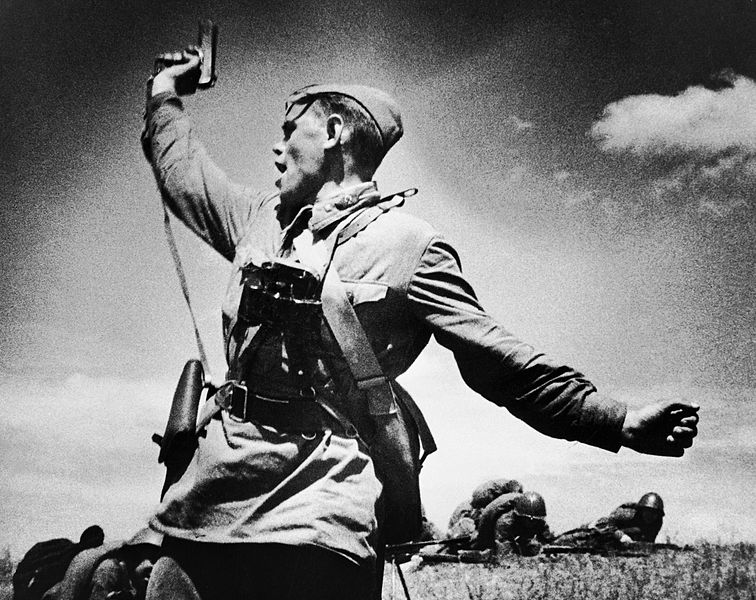
Kombat (Russian: Комбат, lit. “battalion commander”) is a black-and-white photograph by the Soviet photographer Max Alpert. It depicts a Soviet military officer armed with a TT pistol who is raising his unit for an attack during World War II. This work is regarded as one of the most iconic Soviet World War II photographs, yet neither the date nor the subject is known with certainty. According to the most widely accepted version, the photograph depicts junior politruk (political officer) Aleksei Gordeyevich Yeryomenko, minutes before his death on 12 July 1942, in Voroshilovgrad Oblast, Ukraine.
Wikimedia Commons.
But while the Russian – or, more correctly, Soviet – role in defeating Hitler is beyond question and deserves wider attention and recognition, there are several reasons why the Western acknowledgement of the eastern front will always remain qualified and somewhat ambiguous.
Firstly, while Russia continues to variously deny, downplay or excuse the fact, the Soviet Union was the initial co-aggressor in World War Two and for the first two years a Nazi ally and collaborator. Stalin might have had legitimate realpolitik reasons for the Ribbentrop-Molotov pact, in effect sacrificing Europe to win more time to prepare for the inevitable war with Germany (nice in theory, the gambit in any case did not work out in practice), but the fact remains that in concert with Hitler, Stalin invaded Poland and was rewarded with its eastern half, subsequently also helping himself to Bessarbia, annexing the Baltic states and invading Finland. In turn, the fact that Hitler assured himself he would not be facing a war on two fronts, which doomed Germany in World War One, allowed him to successively snatch Poland, Norway, Denmark, the Netherlands, Belgium, France, Yugoslavia and Greece, giving Germany a complete dominance over the continental Europe from the Atlantic to the Bug river and the Arctic Circle to Crete. And while Great Britain stood alone against Germany for a year from mid-1940 to mid-1941, Soviet resources and produce kept flowing in, feeding and arming the Nazi monster. This makes Stalin’s subsequent anger over the Allied delay in launching the Second Front in the West quite hypocritical – where was the Second Front in the East while Luftwaffe was blitzing Britain and its troops were battling Italians and Rommel in north Africa?
Secondly, without in any way diminishing the German barbarity in the east, a significant proportion of the Soviet military and civilian casualties were unnecessary and resulted from the communist government’s complete and utter disregard for the lives and well-being of its subjects. Stalin fought the war as he fought the peace at home. The man who prior to 1941 had managed to send somewhere upwards of 15 million of his own people to an early grave, clearly wasn’t going to spare the long suffering population when faced with an external existential threat. The Soviet Union might not have (at least initially) had much else, but it certainly had people, and they were sacrificed in obscene numbers by the man in the Kremlin and his minions on the ground. For most of the war, several Red Army soldiers were dying for every one German, while obeying absurd orders to stand ground or frontally attack in total disregard for the local circumstances or for that matter any reasonable tactical and strategic consideration. When Eisenhower and Zhukov caught up some time later in the war and the conversation turned to the best method of clearing mine fields, the Russian astonished the Allied Commander-in-Chief when he nominated simply sending the infantry through as the easiest and the cheapest method. This wasn’t a joke either; it was the way the Red Army fought from the first days of Barbarossa all the way to Berlin, even though the eventual overwhelming material superiority did save many an Ivan’s life in the later stages of the conflict. Not enough, however, to wipe out the entire generation of men born in the mid-1920s.
Thirdly, while the Red Army did indeed end the brutal Nazi occupation of the Central and the Eastern Europe, it did not bring freedom in any meaningful sense of the word, except perhaps (in most cases) freedom from sudden death. Debates about similarities and differences between the two totalitarian systems will no doubt continue well into the future. Unquestionably, for an average Slav, the Soviet domination was a better option that the Nazi one. Nazis, by and large, considered Slavs to be subhuman (though making some allowances, often quite significant, for their Slavic allies, like the Slovaks, the Croats or the Bulgarians), fit only to be initially enslaved and eventually exterminated. This was the far deadlier and much more ideological continuation of Germany’s 1000-year “drang nach osten” or the “civilising” mission to expand into the fertile east. Particular hatred was reserved for the Poles, who stood as a barrier for most of that millennium, preventing the dream of lebensraum from being realised. Russia was a much more recent enemy, having overlaid its Slavic barbarity with a Bolshevik malignancy. Even the initial Nazi plans called for starving between 25-30 million Belorussians, Ukrainians and Russians in order to free up food and resources for Germany. Communists could be deadly too, of course, and both the Reds and the Blacks were fond of decimating the local elites and intelligencia, but the Soviets at least did not see their Slavic brethren as subhumans but as proletarian masses to be converted to the glories of Marxism-Leninism.
Be that as it may, the Soviet liberation did not bring liberty or independence to the people of Eastern Europe. That had to wait until 1989-91.
May 13, 2020
May 10, 2020
May 8, 2020
Sending the Jews to Madagascar? – War Against Humanity 011 – May 1941
World War Two
Published 7 May 2020The War Against Humanity is accelerating and accelerating. Across the world, people live under oppression. In Nazi Europe, solutions to the so-called “Jewish Question” has taken on new, fantastical, proportions.
Join us on Patreon: https://www.patreon.com/TimeGhostHistory
Or join The TimeGhost Army directly at: https://timeghost.tvFollow WW2 day by day on Instagram @World_war_two_realtime https://www.instagram.com/world_war_t…
Between 2 Wars: https://www.youtube.com/playlist?list…
Source list: http://bit.ly/WW2sourcesHosted by: Spartacus Olsson
Written by: Francis van Berkel, Spartacus Olsson
Director: Astrid Deinhard
Producers: Astrid Deinhard and Spartacus Olsson
Executive Producers: Astrid Deinhard, Indy Neidell, Spartacus Olsson, Bodo Rittenauer
Creative Producer: Joram Appel
Post-Production Director: Wieke Kapteijns
Research by: Francis van Berkel
Edited by: Mikołaj Cackowski
Sound design: Marek Kamiński
Map animations: Eastory (https://www.youtube.com/c/eastory)Colorizations by:
Olga Shirnina https://klimbim2014.wordpress.com
Dememorabilia – https://www.instagram.com/dememorabilia/
Norman Stewart – https://oldtimesincolor.blogspot.com/Sources:
IWM HU 106212
USHMM
Bundesarchiv
Narodowe Archiwum Cyfrowe
Glaser family photo, courtesy Willie Glaser
from the Noun Project: Letter by Mochammad Kafi, people by ProSymbols, Deteriorated building by Tokka Elkholy, workshop by Gan Khoon Lay from the Noun Project
Page 1 of La Loi Portant Status Des Juifs with Pétain’s annotations, courtesy Mémorial de la ShoahSoundtracks from the Epidemic Sound:
Reynard Seidel – “Deflection”
Farell Wooten – “Blunt Object”
Philip Ayers – “Trapped in a Maze”
Wendel Scherer – “Growing Doubt”
Gavin Luke – “Drifting Emotions 3”
Johannes Bornlof – “The Inspector 4”
Andreas Jamsheree – “Guilty Shadows 4”
Peter Sandberg – “Document This 1”
Jo Wandrini – “Dawn Of Civilization”
Gunnar Johnsen – “Not Safe Yet”
Philip Ayers – “Under the Dome”Archive by Screenocean/Reuters https://www.screenocean.com.
A TimeGhost chronological documentary produced by OnLion Entertainment GmbH.


